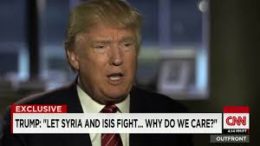


Twitterer-in-Chief Donald Trump
The biggest bully-pulpit in the land is located inside the Oval Office. In the past, the occupants of that office have carefully chosen words and phrases, knowing they can move markets, armies and trends with minimal effort.
Today, we are on the brink of uncharted waters as the next president of the United States appears to be determined to continue to share his thoughts unfiltered and in real-time via Twitter – undoubtedly over the objections of his advisers and family.
Regardless of your partisan preferences, our new Twitterer-in-Chief is rewriting the Presidential Rules of Conduct – and your organization or industry could find itself in his crosshairs.
Here, we present to you some of the latest thinking on this subject.
8 Ways PR Pros Can Prepare for a ‘Trump Crisis’
Crisis experts are already talking about the Trump crisis, which companies face when the president-elect takes aim at an organization, usually through a tweet.
An attack on a business by the leader of the free world is uncharted territory, and coming from Trump makes it worse than if it had come from, say, Barack Obama, Ronald Reagan, Harry Truman or Woodrow Wilson. Trump has an army of trolls poised to attack companies that Trump targets or that articulate anything that could be construed as opposition to his agenda. The consequences can range from a hit to share price to a flurry of fake news stories and calls for boycotts.
Trump’s motives for leveling attacks on organizations are anybody’s guess. Some suggest that he goes after organizations against which he harbors a grudge. His tweet taking on Boeing came a mere 20 minutes after Boeing CEO Dennis Muilenburg mildly criticized the president elect’s China rhetoric.
To read the rest, click here.
NOTE: We’ve received some reports that this link seems to be not working on iPhones. Here’s the direct link to the article for you to cut and paste: https://www.prdaily.com/Main/Articles/22053.aspx
Why the Press is ‘Utterly Unprepared for Trump’
Donald Trump’s administration may dramatically change policies in multiple areas: the environment, social services, labor, education, health care, the United Nations, the Consumer Financial Protection Bureau, you name it. For sure, those changes will be detailed from a Washington-centric, legislative standpoint as Congress passes laws or the administration promulgates new rules or ditches old ones.
But their regional and local (in some cases global) implications will be lost on citizens largely because the media does not have the capability, or willingness, to dissect policy changes on an ongoing basis. It’s much easier to have TV show hosts sit on their butts and beckon pro bono pundits for he-said-she-said debates on the politics of confirming Trump nominees. The other stuff is too expensive and time-consuming.
To read the rest, click here.